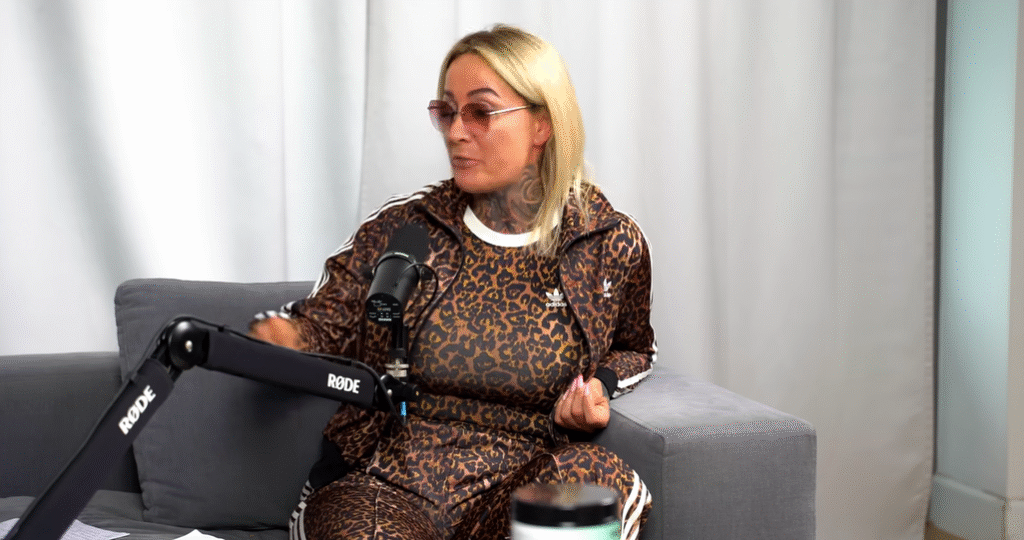Agnieszka Staniszewska has recently come to represent maternal strength. Her voice reverberated throughout Poland’s homes, headlines, and hearts during an incredibly clear and poignant interview with independent journalist Tomasz Zaremba. She conveyed an urgent, unvarnished message about betrayal, dignity, and the unseen price of digital celebrity while sitting in front of the camera with quiet conviction and controlled pain.
Agnieszka isn’t your typical public personality. She is a designer who has shaped visual experiences for mobile platforms, an artist, and a ceramicist who creates meaning from clay. Her life abruptly shifted toward the painfully obvious, though. Agnieszka was thrust into a spotlight she never wanted as the mother of Sandra Staniszewska, whose relationship with contentious influencer Denis Załęcki and her online content garnered increasing media attention. And the nation paid attention when she eventually spoke.
She hadn’t practiced her words. They came from a deeply disillusioned place. She proclaimed, “Do mojego domu kurewstwo nie wchodzi, przy moim stole kurwa nie siedzi.” It served as a boundary, not only against her daughter’s decisions but also against the growing cultural acceptance of exploitation masquerading as empowerment. Her statement, which was extensively shared on social media, was a profoundly personal and incredibly powerful protest rather than vulgarity for the sake of making a statement.
Agnieszka Staniszewska – Bio and Personal Overview
| Attribute | Detail |
|---|---|
| Full Name | Agnieszka Staniszewska |
| Nationality | Polish |
| Residence | Kraków / Środa Wielkopolska, Poland |
| Known For | Public testimony as mother of Sandra Staniszewska |
| Occupation | Artist (Ceramics – Studio Babo), Former UI/UX Designer |
| Social Media Presence | Instagram: @agneessta, @kolekcjaszuwarka |
| Notable Appearance | Viral YouTube interview on family and social breakdown |
| Related Public Figures | Sandra Staniszewska (daughter), Denis Załęcki (public figure) |
| Emotional Advocacy | Spoke publicly against online exploitation and family trauma |
| Support Networks | Supported by Polish online community, public commentators |
| Reference Profile | https://fundacjarakiety.pl/Podopieczni |

Agnieszka contested a narrative that frequently silences the families of influencers by entering the public discourse. She encouraged viewers to comprehend what happens when online celebrity shatters the very people who should be supporting you by being strategically honest. The family was humiliated by her daughter’s decisions, which included explicit adult content and a tumultuous relationship with Załęcki. To make matters worse, Agnieszka was left to deal with unsolicited messages, critical looks, and restless nights.
The audience reacted quickly. Thousands of people left comments, with many of them expressing deep empathy, sadness, and admiration. “As a father of two, I couldn’t hold back tears watching this,” one man wrote. She is attempting to reconstruct something from debris, so this woman is not broken. That sentiment struck a chord, especially since it was expressed by other parents. Agnieszka reminded us of what happens off-camera—when the lights go out but the effects are still there—in a time of hyper-visibility and monetized identity.
The complex and unvarnished mother-daughter relationship is remarkably similar to events taking place all over the world. Around the world, there has been a mixture of admiration and concern for the daughters of famous people like Farrah Abraham and even controversial online personalities like Fagata. However, we hardly ever hear directly from the parents. Agnieszka’s voice pierced the quiet like a sobering bell, reminding us that the effects of parental pain are profoundly human and that the pain itself is not abstract.
She described how she found out about her daughter’s explicit content through the constant sharing of links by others, rather than through conversation, using thoughtful pacing and emotional clarity. Public mockery added to this revelation, which would rock any family to its core. She talked about feeling known for something she never chose, feeling sick, panicking, and being afraid to go outside. She remarked, “I told myself it had to be AI,” alluding to the bizarre contradiction between denial and reality.
Despite these heartbreaking feelings, Agnieszka maintained her remarkable composure. Her viewpoint was especially helpful when it came to conversations about digital ethics. Her appeal stemmed from responsibility rather than repression, despite the fact that a large portion of online culture embraces sexual openness. She was lamenting the loss of the trust, common ideals, and innocence that formerly characterized their relationship rather than humiliating her daughter for her appearance.
Agnieszka accomplished what many parents find difficult: she expressed love while protecting herself emotionally by establishing clear boundaries. She considered her surviving children toward the end of the interview and realized that they must now be the focus of healing. She whispered, “I have other people to live for.” Redirecting energy toward those who are still reachable felt like a significant improvement over the blame cycle that depresses so many.
She is being referred to online as a “modern hero,” “a necessary voice,” and “the bravest mother on YouTube.” Her remarks disarmed even those who criticized her daughter’s way of life. She became a focal point for discussions about generational strife, parental trauma, and the cost of striving for relevance. Her interview also sparked a flood of similar testimonies from fathers, mothers, and even siblings who discussed how celebrity rewires priorities and splits families.
Agnieszka’s story could easily be presented as purely tragic. That would miss the point, though. Despite being motivated by grief, her actions show incredible strength. She didn’t flee. She didn’t conceal anything. Rather, she made her name, face, and truth public—so that others wouldn’t have to go through what she had. This openness is very effective at destroying myths about family, happiness, and celebrity.
Through this process, Agnieszka regained her voice as a principled woman rather than as the mother of a contentious figure. Her bravery has spurred important discussions about what kids owe their parents and what society can do to safeguard the mental health of those caught in viral storms.
Agnieszka’s legacy is still developing as of right now. It’s unclear whether her daughter will reply or if there will ever be a chance for reconciliation. However, it is indisputable that Poland has turned one mother’s suffering into its mirror. And by being so open about her pain, she’s allowing others to express themselves, feel what she’s feeling, and draw their own boundaries.
